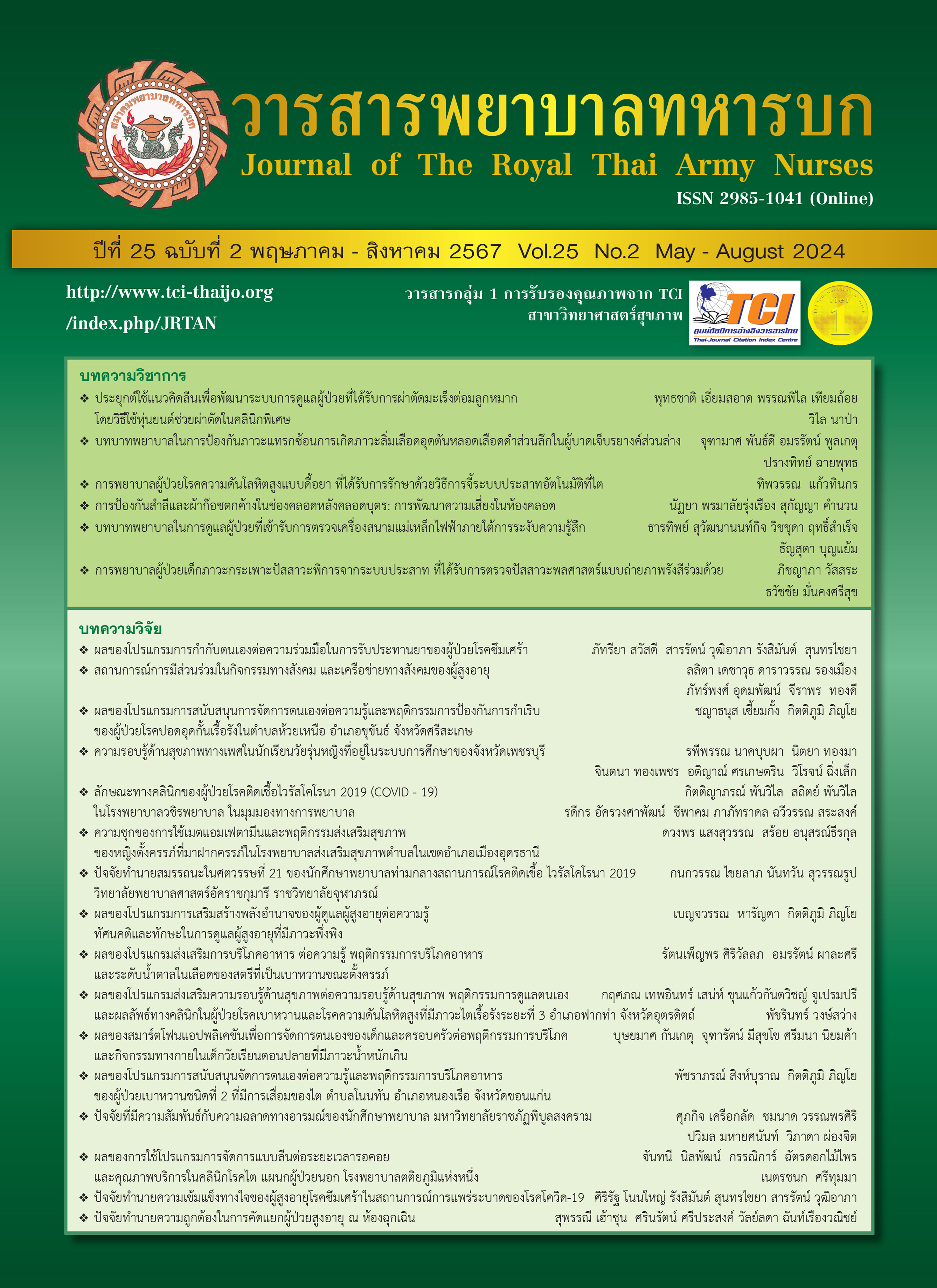Effects of a Theory of The Planned Behavior-Based Program for Intention Not to Drink Alcohol Among Secondary School Female Students in Chiang Rai Province
Keywords:
A theory of the planned behavior, Intention not to drink alcohol, Female adolescentsAbstract
The purpose of this quasi-experimental research was to study the effects of a theory of the planned behavior-based program for intention not to drink alcohol among secondary school female students in Chiang Rai Province. The sample comprised of female lower secondary students in grades 8-9, during the academic year 2023, under the Office of the Basic Education Commission, Chiang Rai. The sample consisted of 32 students in the experimental group and 35 students in the comparison group. Data were collected at before the experiment, after the experiment, and 4-week follow-up. Data were analyzed using descriptive statistics, percentages, mean values, standard deviations, independent t-tests, and Repeated Measure ANOVA. The results showed that the experimental group had significantly higher average scores in knowledge related to alcohol consumption among female adolescents, attitudes towards alcohol drinking behavior, perceived subjective norm to not drink alcohol, perceived behavioral control for not drinking alcohol and in the intention not to drink alcohol in the upcoming month after the experiment and at the follow-up compared to before the experiment (p < .05). Moreover, their scores were also significantly higher than the comparison group (p < .05). Their intention not to drink alcohol in the next 3 months after the experiment was significantly higher than before the experiment (p < .05), but there was no significant difference in the follow-up period compared to before the experiment (p = .574). Additionally, their scores were significantly higher than the comparison group (p < .05).
Downloads
References
World Health Organization (WHO). Global alcohol action plan 2022-2030. Geneva: World Health Organization; 2023.
World Health Organization (WHO). Global status report on alcohol and health 2018. Geneva: World Health Organization; 2018.
Centre for Alcohol Studies. Alcohol Consumption in Thai Society Report 2017. Bangkok: Centre for Alcohol Studies; 2019. (in Thai)
Centre for Alcohol Studies. Patterns and trends in alcohol drinking behavior of the Thai population. Songkhla: Centre for Alcohol Studies; 2022. (in Thai)
Centre for Alcohol Studies. Alcohol Consumption in Thailand 2021. Bangkok: Centre for Alcohol Studies; 2022. (in Thai) 6. Chankhanti W, Paiwan R, Noonpun S. Awareness among Young Non-Drinkers in Chiang Rai of the Alcohol Control Laws. Law and Local Society Journal. 2018; 2(2): 29-56. (in Thai)
Roerecke M, Vafaei A, Hasan OSM, et al. Alcohol consumption and risk of liver cirrhosis: A systematic review and meta-analysis. The American Journal of Gastroenterology. 2019; 114(10): 1574–86.
Liang W, Chikritzhs T. Age at first use of alcohol predicts the risk of heavy alcohol use in early adulthood: A longitudinal study in the United States. International Journal of Drug Policy. 2015; 26(2): 131-4.
Chaochalard P, Benjakul S, Kengganpanich M, Kengganpanich T. Effects of an Alcohol Use Prevention Program Applying Self- Efficacy Theory among 7th Grade Students in Nakhon Pathom Province. Ramathibodi Nursing Journal. 2019; 24(2): 210-24. (in Thai)
Ritmontree S, Daosodsai S, Boontoch K, Chansuk S. The Harmful Impacts of Other People Drinking Alcohol by The Perception of Victims. Udonthani Hospital Medical Journal. 2023; 31(1): 51-61. (in Thai)
Ramsiri K, Homsin P, Srisuriyawet R. Effects of An Information-Motivation-Behavioral Skills Program for Alcohol Drinking Prevention Among Female Adolescents. Journal of Health and Nursing Research. 2020; 38(2): 48-58. (in Thai)
Sukkum S, Powwattana A, Auemaneekul N. Effects of the Program with the Information Motivation Behavioral Skill Model toward the Preventive Behavior in Alcohol Drinking among the Female Vocational Students in Bangkok. Journal of Health and Nursing Research. 2020; 36(3): 57-68. (in Thai)
Ajzen I. The Attitudes, personality and behavior. (2nd Edition). Milton-Keynes:Open University Press-McGraw Hill Education. 2005.
Cohen J. Statistical power analysis for the behavioral sciences. New York: Lawrence Erlbaum Associates. 1988.
Piyaaramwong P, Samawathdana R, Wattanaburanon A. Alcohol drinking prevention program management for lower secondary school female students in Bangkok. Journal of Medicine and Health Sciences. 2017; 24(1): 55-66. (in Thai)
Saleengarm W, Rawiworrakul T, Jirapongsuwan A, Sompopcharoen M. Effects of A New Drinkers Prevention Program for Primary School Students, Surin Province. Journal of The Royal Thai Army Nurses. 2019; 20(1): 147–56. (in Thai)
Cutrín O, Kulis S, Maneiro L, MacFadden I, Navas MP, Alarcón D, Gómez-Fraguela JA, Villalba C, Marsiglia FF. Effectiveness of the Mantente REAL Program for Preventing Alcohol Use in Spanish Adolescents. Psychosocial Intervention. 2021; 30(3): 113 - 22.
Mitkome A, Phetphum C. The effect of the intention not of drinking alcohol program by applying the theory of planned behavior among the 10th grade students in Kongkrailat district, Sukhothai province. Disease Control Journal. 2021; 47(2): 267 - 77.
Downloads
Published
How to Cite
Issue
Section
License
Copyright (c) 2024 Journal of The Royal Thai Army Nurses

This work is licensed under a Creative Commons Attribution-NonCommercial-NoDerivatives 4.0 International License.
บทความหรือข้อคิดเห็นใดใดที่ปรากฏในวารสารพยาบาลทหารบกเป็นวรรณกรรมของผู้เขียน ซึ่งบรรณาธิการหรือสมาคมพยาบาลทหารบก ไม่จำเป็นต้องเห็นด้วย
บทความที่ได้รับการตีพิมพ์เป็นลิขสิทธิ์ของวารสารพยาบาลทหารบก
The ideas and opinions expressed in the Journal of The Royal Thai Army Nurses are those of the authors and not necessarily those
of the editor or Royal Thai Army Nurses Association.






